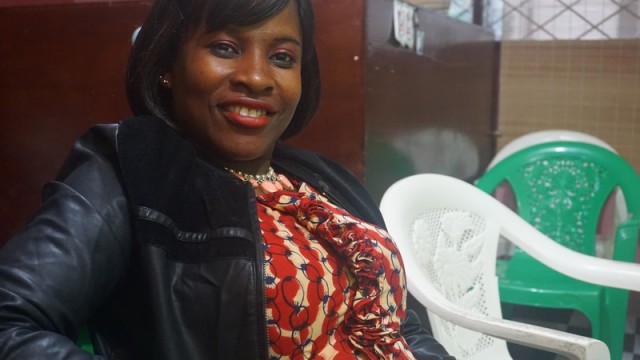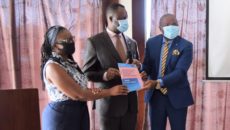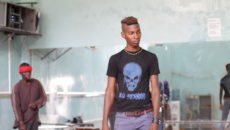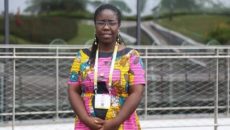MONROVIA, Montserrado – Liberia’s lesbian, gay, bisexual and transgender community continues to struggle for equality against the backdrop of a country that largely views them as the antithesis to their culture.
In interviews, Liberians often used strong words in condemning homosexual behaviors, which they believe to be an unnatural and foreign concept. When asked for his opinion on the topic of granting equal legal protection to members of the LGBT community, Eric Madave said, “That [word] ‘gay,’ we don’t want to hear it.” He added that he believed Liberians as a whole were against homosexuality and pointed out that it was “totally against our culture.”
The major problem most people had with allowing members of the LGBT community to be treated fairly was the fear that it would attract others who may not necessarily be gay. They also held that Liberia is a Christian country and such practices were against the teachings of the Bible. Liberia’s constitution, in fact, calls for a secular country. When confronted with this fact, Harrison Tucker said he was fine with homosexuality “once they do it privately,” but if they went public with their behaviors, he feared they would “influence others who may not be a part of it because of money.”
No reliable statistics exist for the population of the LGBT community in Liberia, mainly because the social stigma associated with their sexual identities makes them unwilling to identify themselves.
Cynthia Gonleh, the Executive Director of the Liberia Women Empowerment Network, said life is difficult for members of the LGBT community partly because Liberians hold a lot of misconceptions about them.

Cynthia Gonleh, the Executive Director of the Liberia Women Empowerment Network. Photo: Jefferson Krua
Gonleh said she once heard a rumor that gay people are incapable of producing children. Another time, she heard women complaining that supermarkets were out of tampons because the gays were now using them too. Or that because of anal prolapse they supposedly encounter from having sex, they cannot sit in chairs regularly and have to tilt their butts because of the pain. Another popularly held idea is that a lot of people copy homosexual behavior from friends in an attempt to fit in. While Gonleh agrees that the last myth may be true, she said it only applies to a minority.
These misconceptions and other prejudices cause members of the LGBT community to face difficulties when performing even the most mundane of tasks. In an interview with four members of the Liberian LGBT community, they described some of the daily difficulties they face. In order to protect their identities, each has been provided with a pseudonym.
All of the interviewees said they avoided going to marketplaces because of the constant stares and harassment. Additionally, in a city where it is difficult to find transportation around town without a private vehicle, they said they often had to charter taxis to get most places, instead of catching a ride just as the average Liberian does. This can cause the price of transportation to be increased to five to six times the original price.
Rico, a 27-year-old student at the African Methodist Episcopal University, said stigmatization and discrimination were their biggest problems as gays in Liberia. “We don’t have access to freedom of speech, freedom of movement,” he said. He said there are few public places where they can meet, especially for nightlife.
Although he said he grew up with the attention of many girls because of his good looks, Rico said he has always liked men. He said both of his parents accept him now, but it was not easy for him to come out as bisexual to his family. In fact, he remains at odds with his older brother to this day because of the humiliation that his brother caused him by calling him a “faggot” to his entire neighborhood. Rico even has scars from physical altercations with his brother due to his bisexuality. He said, “I regret the day he and I came from the same womb.”
For Kim, a 20-year-old transgender female in high school, “it all started when I was a kid.” Although born a male, she had always played among girls and rarely with boys. Kim’s mother has accepted her for who she is, but only because she believes that the time will come when Kim will turn away from her lifestyle.
Though accepted at home, Kim experiences cruel treatment outside. “In my school, I don’t really go out to lunch,” she said. She said she tries to eat enough at home before going to school to avoid having to interact with anyone. Her fellow students have even gone as far as telling the principal that she should not be in school. Other times, they have falsely accused her of performing sexual acts on teachers in the bathroom.
Despite the previous positive stories of members of the LGBT community being accepted by their parents, Gonleh said the vast majority of them have to leave home because their families abandon them. Belina, the 26-year-old current holder of the Miss Liberia Gay crown, falls into that category. He said he has felt this way his entire life and grew up feeling “feminine.” Although Belina identifies as a gay man, he often allows his colleagues to switch between gender pronouns used to refer to him.
Belina said, “My dad didn’t have any problems” with his sexuality, but his mother’s reaction was cruel. He said his mother despised him so much that once when he was in a life-or-death situation at John F. Kennedy Memorial Hospital, his mother refused to visit him. He now lives with his aunt. He said his mother wants nothing to do with him, adding, “She even said she would put rat medicine in food for me.”
Corishma, a 22-year-old transgendered female, has experienced similar difficulties with her family. When she came out to them, they punished her by locking her up and starving her. The punishment was so unbearable that Corishma said she became suicidal during that time. It was only after neighbors and family members begged her parents that she was able to move out of their home. She said she was being punished for who she is. “I’ve always wanted to be who I am and I mean, seeing myself as a woman – a born woman,” she said.
It is because of these issues that Gonleh and her organization try to create a safe space for members of the LGBT community. Gonleh herself had several personal experiences with homosexuals that allowed her to become sympathetic to the cause. She said her deceased sister was a lesbian, adding, “Hiding yourself from your family, how long will it take?”
Additionally, because her organization works to halt the spread of HIV/AIDS in Liberia, Gonleh said they had to reach out to the LGBT community. “We cannot do HIV/AIDS work while leaving them out,” she said.
When they initially started reaching out to these communities, Gonleh said LIWEN as an organization did not fully understand the issue. She and some members of the staff traveled across the world to see how members of the LGBT community could be treated with respect. She said she visited several gay clubs in places like New York.
Gonleh said she became open-minded and subsequently directed her staff to work with all human beings to promote their rights, regardless of who they were. She makes a practice of not hiring anyone who would be uncomfortable sitting next to a gay person and maintains a close camaraderie with members of the LGBT community who seek her organization’s assistance. Before the interview began, she was on the phone referring to a transgender female as “fine girl.”
Gonleh said Liberians who believe that homosexuality is something that was first introduced by westerners are lying to themselves. She said it has been present for generations and still continues now even in the rural areas. “Go to River Gee and Sinoe,” she said. “You will see men that love their friend man.” She even said some of the politicians and pastors are closeted gays who push anti-gay rhetoric to avoid scrutiny.
Despite all the issues the LGBT community faces, Gonleh believes situations are improving. She mentioned a prominent Liberian who came out as gay one year ago on Facebook after he moved to the United States. The incident prompted a lot of discussion in Liberia, especially among people who had already suspected that he was gay.
In more signs of improving conditions, Gonleh said most of her ‘boy children’ are getting married, even if they do it in secret. She recalled two adults who recently married in a ‘grand wedding’ in rural Liberia. She said there were about 70 people attending the wedding, all of whom were either members of the LGBT community or sympathetic to the cause. Both men now live together in Old Road Community. Gonleh said one of the men is slightly insulated from some of the stigmas because he has some money and helps his family, instead of relying on them. Within larger society, he has always been open about his sexuality, although community members sometimes gave him grief.
As of late, there has been a push by NGOs and western governments to push for gay rights in African countries, even when their countries did not afford gays equal rights. In what they see as an invasion of their culture, African governments have often attempted or made a bigger push back that ends up making conditions worse for gays.
In Uganda, the infamous Anti-Homosexuality Act was passed before being invalidated by a court due to procedural issues. The bill had aimed to institute the death penalty for anyone guilty of homosexual acts. In Liberia, amid activism for gay rights by Archie Ponpon, who was largely seen as financed by the United States government, Sen. Jewel Howard Taylor introduced a bill to criminalize being gay.
Gonleh does not feel like her work makes things worse by advocating for gay rights. She attributes this to the gradual approach her organization is taking. In fact, Gonleh said it is not the time to advocate for marriage rights for the LGBT community in Liberia yet. “We’re not saying they should get married, but they should be treated fairly,” she said. Part of her focus is on making sure that they receive nonjudgmental and fair treatment from the police and from healthcare workers.
LIWEN attempts this by conducting sensitivity training with hospitals and police depots. Gonleh said these pieces of training are not gaining systematic traction. Usually, one or two nurses and police officers would become fully invested in being sensitive to the LGBT community but that person would move to another assignment or job and they would have to start from scratch. Overall, she said LIWEN is training professionals, “but they’re not willing to put the training into action.”
While all of the four LGBT men and women interviewed have come out to their families, voluntarily or not, they all said conditions are still not safe for them to come out to the general public. Collectively, they said the only way they could come out as their true selves in society is if they were provided with a safe community in addition to protection from stigmatization and discrimination in the workplace.
Rico recalled last year at the height of the Ebola outbreak when the National Council of Churches issued a statement blaming Ebola on gays. Many news sources subsequently reported that gays were being attacked. In fact, Corishma cited her experience with being badly beaten up during this time. “I have pictures in my camera, how I was beaten,†she said. She recalled how some of her friends in the gay community could not go home because their communities were no longer safe.
Even despite the disapproval by church leaders, all the LGBT men and women indicated they still either want to go to church or continue to regularly attend church. Rico said his love for singing in the choir and at weddings are some of the things that keep him still attending churches. As for Corishma, even though she would like to, she has avoided churches ever since a traumatic experience. Around the time of her coming out to her family, Corishma said, when she went into the church one Sunday, her mother stood up in church and announced, “My faggot son is coming.” Corishma said, “Because of that, I don’t go to church, even when they invite me.”
Gonleh said because some people know of the work she does, she has had pastors come to her house to chastise her. “Is this the only sin that God knows?” Gonleh said.
On the other hand, Pastor Moses Tah of the Beawo Baptist Church in the Monrovia neighborhood of Sinkor said he would have no problem welcoming gays into his church. “Yes, they are welcome. Come to service.” Speaking on the issue of some pastors blaming the gays for the Ebola outbreak, he expressed the view that it was tricky to really know the will of God. “Even though because of sin, God can bring curse upon a nation – I don’t think so,” he said.
When asked what his reaction would be if his child came out as gay to him, Tah said he would tell the child that it was wrong and unacceptable as a Christian. He said, “It’s not correct because God did not prepare woman for woman and man for man.” He, however, did not go as far as to say he would disown his child.
Such inhospitable conditions may work to push some in the LGBT community to America. In fact, one of the rumors in Liberia is that some individuals may be simply pretending to be gay in order to travel to the U.S. or other western countries as asylees. The United States grants asylum for persecution based on sexual orientation.
The four individuals in the interview expressed their love for Liberia and a wish to stay in the country, except for one condition. Corishma, one of the transgendered men, said, “If I’m leaving, I’m going for my surgery to come back.” She beamed with pride as she said, “I want to be the person to make that history.”
Editor’s note: This article has been modified to removed references to ActionAid in order to avoid any suggestion that ActionAid is involved in promoting LGBT rights in Liberia. Additionally, the photographs showing the backs of members of the LGBT community who were interviewed for this article have been removed as they are fearing for their safety.



